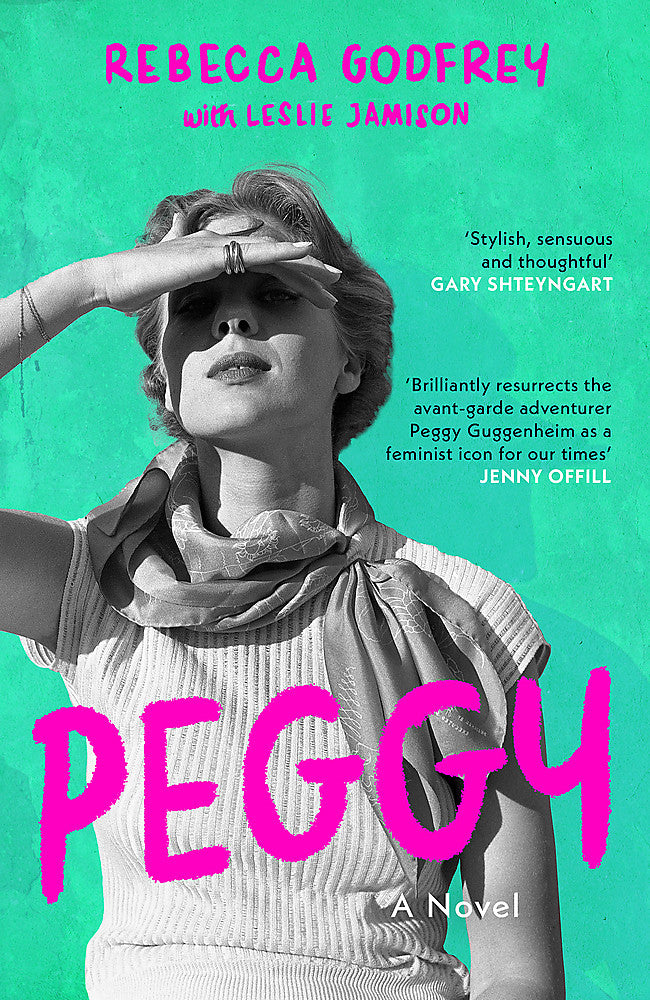Rebecca Godfrey
Peggy
Peggy
Couldn't load pickup availability
Susan Midalia's Review
Award-winning American writer Rebecca Godfrey spent ten years researching and writing her dazzling novel Peggy: a fictional biography of the heiress and famous art collector Peggy Guggenheim (1898-1979). One of the great strengths of this beautifully written and richly imagined story is its subversion of the stereotype of Peggy as “a striving dilettante, an imposter among the avant-garde, a faker of good taste, and a sort of sad, undesirable floozy.” (Vogue magazine, 6th Nov 2015) Godfrey’s version of the woman reputed to have slept with over 1,000 men is that of a highly intelligent and unconventional woman who, for all her enormous wealth and privilege, was burdened by the deaths of the three people she loved most - her father, her lover John Holms and her older sister Benita - and by the twin scourges of anti-Semitism and sexism. Her first marriage to the artist Laurence Vail was also a disaster: Vail was a violent bully, prone to bouts of drunkenness, self-pity and an overwhelming need to control his wife.
But Peggy is no poor-little-rich girl story of victimhood. Narrated by Peggy herself, the novel shows how she treasured art for its own sake rather than as an investment; her unstinting support of a host of artists and intellectuals, including the writer Djuna Barnes, the painter Jackson Pollock and the political activist Emma Goldman; and the sheer excitement of belonging to a wildly stimulating group of people intent on revolutionising both art and ways of living.
The book’s interweaving of Peggy’s personal life and her wider social context is shown in the titles of its three separate sections: Old Masters, Surrealism and Modernism. Like the genre of paintings to which the titles refer, Peggy moves from a New York existence of stifling conventionality and the weight of the past to a socially and sexually liberated life in Paris, and finally to the focus on individualism and art that led her to establish her famous gallery in Venice in the 1950s.
Peggy is a stylistically exhilarating and emotionally haunting novel. Its use of Peggy as a first-person narrator creates a sense of intimacy with her character without ever lapsing into sentimentality or egotism. The Peggy of this novel is both exuberant and prone to regret and self-doubt; tender and steely; a libertine who values human connection and mutual respect. Sadly, the book’s author, Rebecca Godfrey, died shortly before she was able complete the book. It was left to her friend and fellow writer Leslie Jamison to put the finishing brushstrokes onto a beautiful portrait of a fascinating individual whose life spanned decades of turbulent social change.
Publisher's Review
Venice, 1958. Peggy Guggenheim, heiress and now legendary art collector, sits in the sun at her white marble palazzo on the Grand Canal. She's in a reflective mood, thinking back on her thrilling, tragic, nearly impossible journey from her sheltered, old-fashioned family in New York to here, iconoclast and independent woman.
Rebecca Godfrey's Peggy is a blazingly fresh interpretation of a woman who defies every expectation to become an original. The daughter of two Jewish dynasties, Peggy finds her cloistered life turned upside down at fourteen, when her beloved father goes down with the Titanic. His death prompts Peggy to seek a life of passion and personal freedom, and, above all, to believe in the transformative power of art. We follow Peggy as she makes her way through the glamorous but sexist and antisemitic art worlds of New York and Europe and meet the numerous men who love her (and her money), while underestimating her intellect, talent, and vision. Throughout, Peggy must balance her loyalty to her family with her need to break free from their narrow, snobbish way of life and the unexpected restrictions that come with vast fortune.
With intellect and style, Rebecca Godfrey, in her final book-completed by her friend, the acclaimed writer Leslie Jamison-brings to life a woman who helped make the Guggenheim name synonymous with art and genius, recasting her as, in the words of novelist Jenny Offill, 'a feminist icon for our times.'
Share


